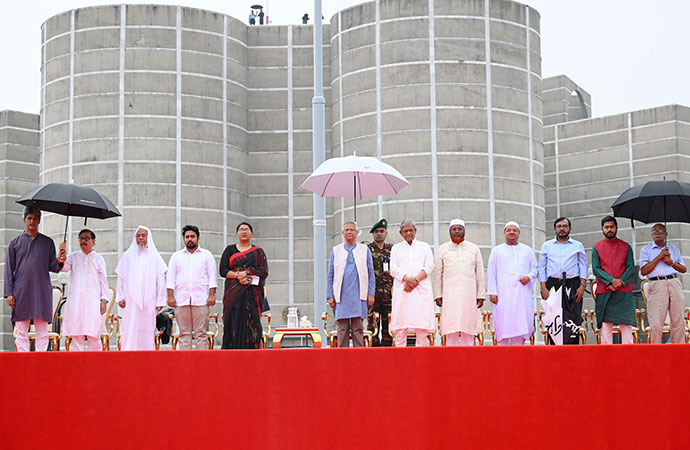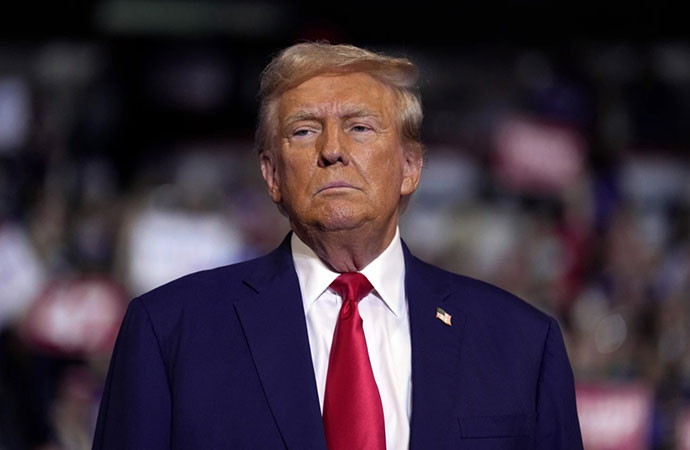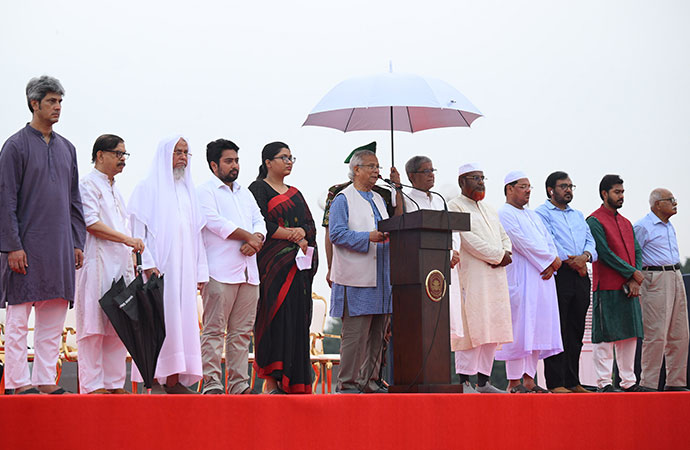Reportage

Photo: PID
Lifting a weight off the nation's shoulders, Chief Adviser Muhammad Yunus disclosed the government's plan to arrange the next general election, to elect the 13th Jatiya Sangshad, in February 2026, before Ramadan starts (expected on February 17). It represents a climbdown from the chief adviser's own, earlier stated preference to have it in April. The move is seen as a nod to the BNP, which with each passing day continues to cement its position as the dominant political force in the country, in the absence of the Awami League, whose activities continue to be banned.
The announcement came on the evening of August 5th, as the nation celebrated the first anniversary of the culmination of last year's July Uprising. In his televised address, which came on air shortly after he had read out the July Declaration conferring constitutional legitimacy on the Uprising, the chief adviser emphasised that the three core responsibilities of the interim government are reform, justice, and the conduct of a national election.
He stated, "Now, it is time for us to fulfill our final duty: to hold the election. From this moment, on this historic day, we are entering the final and most important chapter of our mandate. We are about to begin the process of transferring power to an elected government."
Dr Yunus added, "On behalf of the interim government, I will send a letter to the Chief Election Commissioner, requesting that the Election Commission organise the national election in February 2026, before the start of Ramadan."
The letter was duly received by the EC the next day. Chief Election Commissioner AMM Nasir Uddin said he and his fellow commissioners were ready to arrange the election within the timeframe announced by the CA, even as he flagged a number of challenges.
AMM Nasir Uddin also presented the progress of the ongoing election preparations to the newsmen. In response to a question, the CEC said that the Election Commission views building public trust in the commission, ensuring voter turnout, and preventing the misuse of AI as key challenges. However, they remain hopeful that the upcoming election will be 'as transparent as a mirror'.
In response to another question, the CEC said that the law and order situation is improving. There are still a few months left, and they hope the situation will be fully under control by then. He further stated that among the major preparatory tasks, the voter list update is in its final stages, the draft of the parliamentary constituency boundaries has been published, the registration process for new political parties is ongoing, and procurement activities are underway. They expect the major preparatory work to be completed by September. The schedule for the election is expected by December.
Immediately following the election announcement, the government seemed to visibly shift gears to election mode. Understandably so, since it was always the case that despite the ambitious reform agenda the interim government decided to take on, it would always be remembered and judged on the quality of the election it is able to deliver. At a time of grave national crisis, Bangladesh turned to one of its ablest sons, whose reputation precedes him in global power centres. Failure was not an option.
Although the people's expectations of the interim government at times went sky high, with a corresponding fair assessment of the challenges it faced often missing from the discourse, having spent one year at the helm, the interim government can be expected to have a better idea now of what it can and cannot achieve. The next six months, till the election, would constitute the 'second phase' of the IG, Dr Yunus said at a meeting with his advisory council on Thursday (Aug. 7).
The election would take priority over everything else in the second phase, although the work on reforms and the trials at the International Crimes Tribunal would continue simultaneously.
According to Press Secretary Shafiqul Alam, two motions of thanks were adopted during the meeting of the Advisory Council. Commerce Adviser Sheikh Bashir Uddin was thanked for his role in reducing the reciprocal tariff imposed by the United States. It was noted that he led from the front in the process, which resulted in the reciprocal tariff being reduced from 35 per cent to 20 per cent.
Cultural Adviser Mostofa Sarwar Farooki was also congratulated for successfully and smoothly overseeing the month-long events marking the anniversary of the July Uprising.
At the press conference following the meeting, the press secretary further said that since the interim government assumed office on August 8 last year, the Advisory Council had made a total of 315 decisions. Among these, 247 have been implemented-accounting for 78.41 percent. He termed it a record for any government since independence.
Shafiqul Alam added that out of the 121 urgent recommendations made by the 11 reform commissions, 16 have been implemented so far. Another 85 are in the process of implementation, 10 have been partially implemented, and discussions are ongoing regarding the feasibility of implementing the remaining 10.
The lone monolith
The BNP, unsurprisingly, was effusive in its praise of the CA's decision. In its eyes, the CA could do no wrong that day, as it welcomed both the July Declaration and the announcement to hold the upcoming election in February. The party has also officially entered into the electoral process with that.
However, a few parties, including the National Citizen Party (NCP), Jamaat-e-Islami and Islami Andolan, have expressed dissatisfaction over some issues related to the July declaration and election schedule. None of them, however, have any objection regarding the time announced for the election.
These three parties, which have grown into rivals of the BNP in the changed political context after the July Uprising, stressed on ensuring level playing field. Most of the parties, apart from these, have welcomed the election time announced by the chief adviser.
Political analysts say that with the July Declaration and the announcement of the national election time by Dr Yunus, the political parties have effectively been set on course for the election. All eyes are now on the Election Commission's announcement of the election schedule.
BNP acting chairman Tarique Rahman praised the government for presenting the July Declaration and announcing election timeline, while addressing one of the party rallies virtually.
He said, "We welcome these initiatives to ensure people's rights."
BNP had long been demanding that the country move swiftly towards elections and announce the polling date. At the same time, some key stakeholders and institutions of the state also wanted the election to be held without delay. It is also learnt that several members of the interim government's advisory council wish to step down after holding the election promptly. Altogether, pressure had mounted regarding the announcement of the election date.
The party gave its official reaction to the chief adviser's address to the nation at a press conference the next day. Terming the announcement "historic", BNP secretary general Mirza Fakhrul Islam Alamgir said it would help end the political deadlock and pave the way for democratic transition. BNP expressed hope that the government and the Election Commission would take all necessary steps to ensure that the election is free, fair, impartial, and acceptable to all.
However, there are concerns among some parties, including Jamaat, NCP and Islami Andolan, whether the government will be able to create a level playing field. They think the law enforcement agencies are still not organised. They are still uncertain about the effective role of other forces and agencies involved in the process. A gap remains between them and the government in this regard.
Leaders of these parties believe that, so far, the overall political atmosphere across the country appears to be largely one-sided in favour of a few parties. In such a situation, ensuring neutrality at all levels of the administration, including the Election Commission, would be quite challenging. They fear that without effective initiatives and steps from the government, efforts to hold an acceptable election may be hindered.
Jamaat, NCP, and Islami Andolan issued official reactions regarding the July Declaration and the announcement of the national election timeline. While they did not object to the timing of the election, they did express disappointment over certain issues.
With its chief having undergone open heart surgery recently and hence unavailable for comment, Jamaat-e-Islami's initial reaction in a statement was to say they were not dissatisfied with the announcement of the election timeframe. However, they believed the process of the announcement was flawed.
According to them, August 5 was the anniversary of the mass uprising and a significant day. It would have been better if the chief adviser had stopped with only the July Declaration on that day instead of delivering an address to the nation and announcing the election timeframe that evening. They said it could have been done on August 8, the anniversary of the government's assumption of office, which would have highlighted the importance of that day.
The time in between could have been used to uphold the long-standing tradition of holding discussions with political parties before announcing the election date. That would have made the announcement of the election more 'graceful'.
While addressing a press conference, Jamaat's nayeb-e-ameer Abdullah Mohammad Taher said his party has no objection with elections being held in February. But before that the government must ensure a legal basis of the July Charter and level playing field.
He said, "We are observing that the government has not yet been able to create a conducive environment as it was expected. So the election needs to be held on the basis of the July Charter as per the election timeline given by the chief adviser to ensure it is free and fair."
Meanwhile, NCP has demanded the upcoming election be held on the basis of implementation of the July Charter, which is yet to be finalised, and the July Declaration (see below).
NCP member secretary Akhter Hossain said at a press conference that the party has no objection to the government's proposed timeline of holding the election between December and June. However, the government must pledge the neutrality of the field administration and ensure a level playing field before the election.
At a press conference organised by Islami Andolan Bangladesh, the party's ameer Mufti Syed Muhammad Rezaul Karim said, "A level playing field has yet to be created for the election. Under such circumstances, it will be difficult for us to take part in the polls. At present, the administration is not functioning properly, and the government is failing to control it. In such a situation, if the election is held, candidates will face security risks. I ask you, why should we contest the election under such risks?"
The leaders of these parties believe that since the bilateral meeting between Chief Adviser Muhammad Yunus and BNP's acting chairman Tarique Rahman in London on June 13, the government has been moving forward prioritising BNP's demands. They say BNP's demands were given precedence in both the July Charter and the announcement of the election timeline.
The July Declaration
The July Declaration, not to be confused with the July Charter, was presented before the nation on Tuesday afternoon (Aug. 5). The National Consensus Commission is still working to finalise the July Charter.
Both documents have turned into topics of significant political discussion in recent times. While the two documents may appear similar, they are fundamentally different.
Put simply, the July Declaration is a political document affirming the July 2024 mass uprising, aiming to grant it constitutional and state recognition.
This 1,068-word document is clearly modeled after the Declaration of Independence that was read at the oath-taking ceremony of Bangladesh's first government on April 17, 1971, in Mujibnagar. While the structure is nearly identical, the message is different. The document is divided into 28 clauses, which can be summarised as follows:
The people of Bangladesh, through mass resistance, declared independence on 26 March 1971, against 23 years of deprivation, exploitation, and genocide by Pakistan's autocratic rulers, and established the state of Bangladesh with the aim of national liberation.
The people made the ultimate sacrifice to realise the dream of a liberal democratic state based on equality, human dignity, and social justice as declared in the Proclamation of Independence.
The post-independence Awami League government failed to fulfill the public aspirations of the Liberation War due to flaws in the formulation, structure, and misuse of the 1972 Constitution.
On November 7, 1975, a unified revolution of soldiers and people replaced the one-party BAKSAL system with multi-party democracy, freedom of expression, and judicial independence.
After a prolonged nine-year struggle by students and the public against military dictatorship, the 1990 mass uprising led to the restoration of parliamentary democracy in 1991.
The 1/11 political conspiracy opened the door to Sheikh Hasina's absolute power, dominance, and authoritarianism in Bangladesh.
Under Hasina's leadership, a deeply anti-people, authoritarian force turned Bangladesh into a fascist, mafia-controlled, and failing state, violating human rights. At the peak of intense public protests, Sheikh Hasina resigned and fled the country on 5 August 2024.
On 8 August 2024, following the Supreme Court's opinion, an interim government was formed under the leadership of Dr. Muhammad Yunus.
The declaration expresses the intent to establish the rule of law, human rights, a corruption- and exploitation-free, egalitarian, and values-based society - and a democratic state - through a free, fair, and impartial national election and necessary constitutional reforms, in line with the people's expectations.
It concludes by stating that it will receive constitutional recognition, and that a future elected government will include it in the schedule of the Constitution. Some commentators have noted that it merely seeks to replace one biased version of history (the Awami League's) with its own. However, the Declaration should not be seen as a history lesson. Its ultimate intent is bound to be in the legal field, to provide legitimacy to the actions on the part of civilians during the July Uprising, and that is how it should be seen.

























Leave a Comment
Recent Posts
Religion and Politics: A Toxic ...
At Dhaka University, cafeteria workers have been told not to wear shor ...
Enayetullah Khan joins AsiaNet ...
AsiaNet’s annual board meeting and forum was held in Singapore, ...
In a New York minute
Many leaders back a UN call to address challenges to ..
Defaulted loans at Non-Bank Financial Institutions ( ..
How the late Zubeen Garg embodied cultural affinitie ..